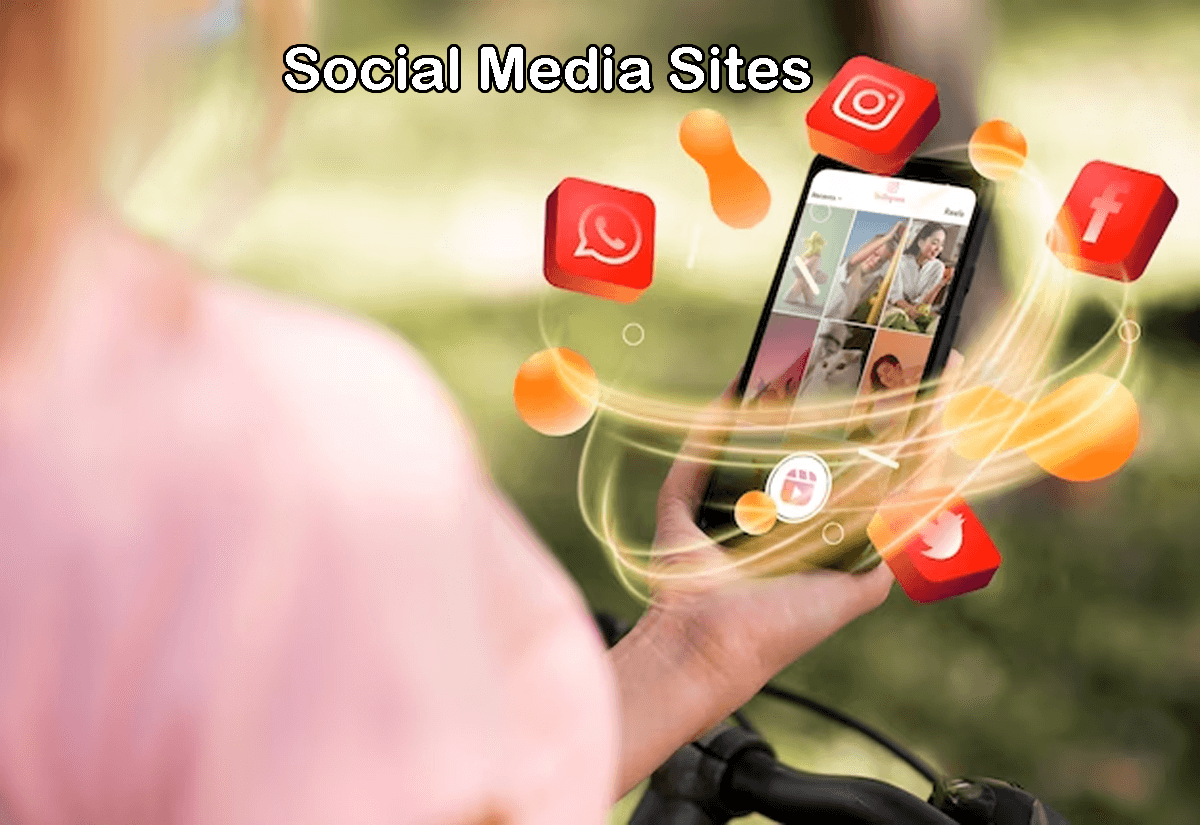What's Inside?
Top Social Media Sites & Platforms
- Facebook: With over 2.8 billion monthly active users, Facebook is the world’s largest social network. It allows users to connect with friends and family, share photos and videos, and join groups and communities.
- YouTube: YouTube is the world’s largest video sharing platform, with over 2.3 billion monthly active users. Users can upload and watch videos on a wide range of topics, including music, tutorials, vlogs, and more.
- Instagram: Instagram is a photo and video sharing app that has over 1.2 billion monthly active users. It allows users to share photos and videos, follow other users, and discover new content through hashtags and the explore page.
- WhatsApp: With over 2 billion monthly active users, WhatsApp is a popular messaging app that allows users to send texts, voice messages, and make voice and video calls.
- Twitter: Twitter is a micro-blogging platform with over 330 million monthly active users. It allows users to post short messages, or tweets, and follow other users to see their tweets in their feed.
- LinkedIn: LinkedIn is a professional networking site with over 740 million members. It allows users to create a professional profile, connect with other professionals, and find job opportunities.
- Pinterest: Pinterest is a visual discovery and bookmarking platform with over 450 million monthly active users. It allows users to save and organize images and videos on boards, as well as browse and discover new content based on their interests.
- Snapchat: Snapchat is a messaging app with over 300 million monthly active users. It allows users to send and receive disappearing photos and videos, as well as chat with friends and discover new content through the Discover page.
- Reddit: Reddit is a social news and discussion site with over 430 million monthly active users. It allows users to post and comment on content, as well as discover new content through subreddits, or communities focused on specific topics.
- Discord: Discord is a communication platform designed for gamers, with over 250 million registered users. It allows users to voice and text chat with other gamers, as well as join communities and servers focused on specific games or interests.
Why Should Your Business Use Social Media?
 There are many reasons why your business should use social media. Here are some of the most important ones:
There are many reasons why your business should use social media. Here are some of the most important ones:
- Increased brand awareness: Social media platforms provide businesses with a large and engaged audience that can help increase brand awareness. By posting relevant content and engaging with followers, businesses can gain more exposure and build a strong online presence.
- Customer engagement: Social media platforms are an excellent way to engage with customers and build relationships with them. By responding to comments and messages, businesses can provide excellent customer service and show that they care about their customers.
- Cost-effective marketing: Social media platforms offer cost-effective marketing opportunities compared to traditional advertising methods. By using social media to promote products and services, businesses can reach a large audience without spending a lot of money.
- Market research: Social media platforms provide businesses with valuable insights into their customers’ needs, preferences, and behaviors. By monitoring conversations and feedback on social media, businesses can gather information that can help them improve their products and services.
- Competitive advantage: By using social media effectively, businesses can gain a competitive advantage over their rivals. By creating high-quality content and engaging with followers, businesses can establish themselves as leaders in their industry.
- Increased website traffic: Social media platforms can drive traffic to a business’s website. By posting links to website content and promotions, businesses can attract visitors to their website and increase conversions.
Social media can be a powerful tool for businesses looking to connect with customers, build their brand, and increase their revenue.
What Is the Best Social Media Site for Businesses?
The best social media site for businesses depends on the nature of the business and its target audience. Here are a few popular social media sites and how they might benefit different types of businesses:
- Facebook: Facebook is a great social media platform for businesses of all sizes and industries. It offers a wide range of marketing tools, including targeted advertising, and has the largest user base of any social media platform, making it a great way to reach a large audience.
- LinkedIn: LinkedIn is a professional social networking site that’s ideal for businesses in the B2B (business-to-business) space. It’s a great way to connect with potential customers, partners, and employees, and to showcase industry expertise.
- Instagram: Instagram is a visual social media platform that’s perfect for businesses in industries that rely on images and videos to showcase products or services. This includes businesses in fashion, food, travel, and other visually-oriented industries.
- Twitter: Twitter is a micro-blogging site that’s ideal for businesses that want to engage in real-time conversations with customers and followers. It’s also a great way to keep up with industry news and trends.
- YouTube: YouTube is a video-sharing platform that’s perfect for businesses that want to create and share high-quality video content. This includes businesses in industries like entertainment, education, and technology.
The best social media site for a business will depend on its goals, target audience, and the type of content it wants to share. It’s important for businesses to experiment with different social media platforms to see what works best for them.
How do you choose where to spend your time (and potential ad spend)?
 Choosing where to spend your time and ad spend on social media can be a challenging task. Here are a few factors to consider when making this decision:
Choosing where to spend your time and ad spend on social media can be a challenging task. Here are a few factors to consider when making this decision:
- Your target audience: The first step is to identify your target audience. This will help you determine which social media platforms they use the most and where you’re most likely to find them.
- Your business goals: The social media platforms you choose should align with your business goals. For example, if your goal is to increase website traffic, you might want to focus on platforms that allow you to include clickable links in your posts, such as Facebook and Twitter.
- Your content strategy: Different social media platforms are better suited for different types of content. For example, Instagram is great for visual content like photos and videos, while Twitter is better suited for short, text-based posts. Your content strategy should inform which platforms you choose to focus on.
- Your budget: Ad spend can vary widely depending on the platform and the audience you’re targeting. It’s important to consider your budget when choosing where to spend your ad dollars. Some platforms, like Facebook and LinkedIn, offer highly targeted advertising options that can be very effective, while others may be more expensive and less targeted.
- Analytics and data: Finally, it’s important to regularly analyze your social media data and use that information to inform your strategy. Use social media analytics tools to track engagement, reach, and other metrics to see which platforms are performing best for your business.
By considering these factors, you can make an informed decision about where to spend your time and ad spend on social media.
What is a social media management platform?
A social media management platform is a tool that businesses and individuals can use to manage their social media accounts from a single dashboard. These platforms typically allow users to schedule and publish posts, monitor social media activity, and analyze performance metrics across multiple social media accounts.
Some common features of social media management platforms include:
- Content planning and scheduling: Users can create and schedule social media posts in advance, ensuring a consistent posting schedule and saving time.
- Analytics and reporting: Social media management platforms allow users to track performance metrics such as engagement, reach, and follower growth across all their social media accounts.
- Social listening: Some platforms allow users to monitor social media activity, such as mentions and hashtags related to their brand, allowing them to engage with followers and respond to customer inquiries.
- Collaboration and teamwork: Social media management platforms allow teams to work together on social media campaigns and content creation, with features like team messaging and content approval workflows.
- Integration with other tools: Many social media management platforms integrate with other tools like CRM software, email marketing platforms, and website analytics tools, allowing users to track social media performance alongside other marketing metrics.
Social Media Sites FAQs
- Social media management platforms: As I mentioned earlier, social media management platforms are tools that allow businesses to manage their social media accounts from a single dashboard.
- Content creation tools: There are many tools available to help businesses create high-quality visual content for social media, such as Canva, Adobe Spark, and Piktochart.
- Hashtag research tools: Hashtags are an important part of social media marketing, and tools like Hashtagify and RiteTag can help businesses find and analyze popular hashtags in their industry.
- Social listening tools: Social listening tools allow businesses to monitor social media for mentions of their brand, competitors, and industry trends. Some popular social listening tools include Hootsuite Insights, Mention, and Brand24.
- Influencer marketing tools: Influencer marketing is a popular social media strategy, and tools like AspireIQ and Upfluence can help businesses find and connect with influencers in their industry.
- Social media advertising platforms: Social media advertising platforms, such as Facebook Ads and LinkedIn Ads, allow businesses to create and run targeted ads on social media.
- Analytics and reporting tools: Many social media platforms offer their own analytics and reporting tools, but there are also third-party tools like Sprout Social and Buffer Analyze that can provide more detailed insights and analysis.
- Develop a social media strategy: Before you start posting on social media, it's important to develop a strategy that outlines your goals, target audience, and content plan.
- Use a social media management platform: As I mentioned earlier, a social media management platform can help businesses manage their social media accounts from a single dashboard, saving time and improving efficiency.
- Create a content calendar: A content calendar can help businesses plan and organize their social media content in advance, ensuring a consistent posting schedule.
- Engage with your audience: Social media is a two-way conversation, so it's important to engage with your followers by responding to comments and messages and asking for feedback.
- Monitor and analyze performance: Regularly monitoring and analyzing your social media performance can help you identify what's working and what's not, and make data-driven decisions about your social media strategy.
- Stay up-to-date with trends and best practices: Social media is constantly evolving, so it's important to stay up-to-date with the latest trends and best practices to ensure you're maximizing the potential of each platform.
- Building and maintaining brand reputation: Social media gives businesses an opportunity to build and maintain their brand reputation by engaging with customers, responding to feedback and inquiries, and providing valuable content.
- Increasing brand awareness: By regularly posting content and engaging with followers, businesses can increase their brand awareness and reach a wider audience on social media.
- Driving website traffic and sales: Social media can be a powerful driver of website traffic and sales, particularly when businesses use targeted advertising and strategic content to reach their ideal audience.
- Improving customer relationships: Social media provides a platform for businesses to engage with customers, build relationships, and provide personalized support and service.
- Staying competitive: Social media is a rapidly-evolving landscape, and businesses that fail to effectively manage their social media presence risk falling behind their competitors.
- Measuring and optimizing performance: Social media management allows businesses to measure and analyze their social media performance, identify areas for improvement, and make data-driven decisions about their social media strategy.
- YouTube: 2.3 billion monthly active users
- WhatsApp: 2.24 billion monthly active users
- Facebook Messenger: 1.3 billion monthly active users
- WeChat: 1.309 billion monthly active users
- Instagram: 2.35 billion monthly active users


